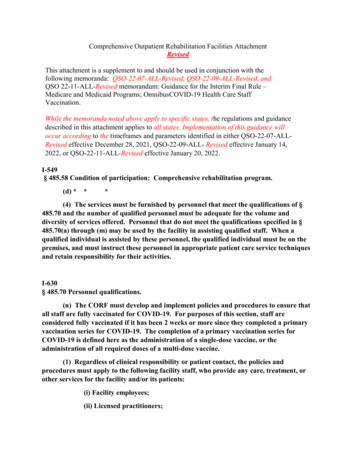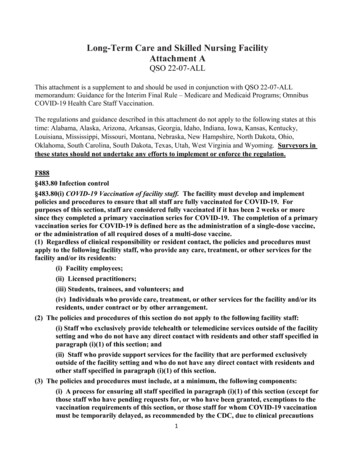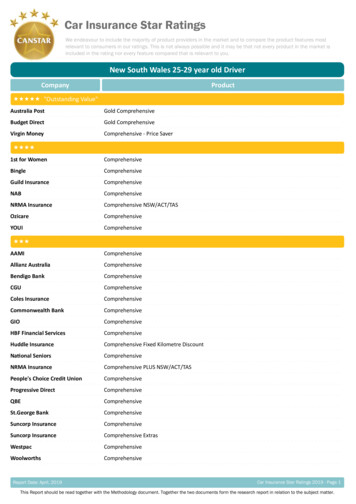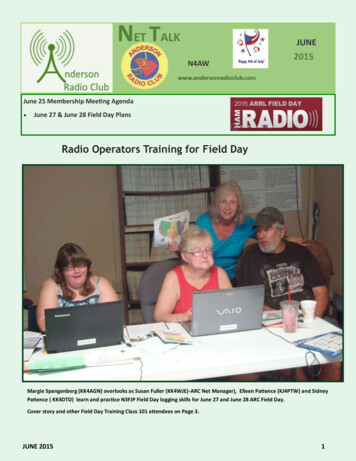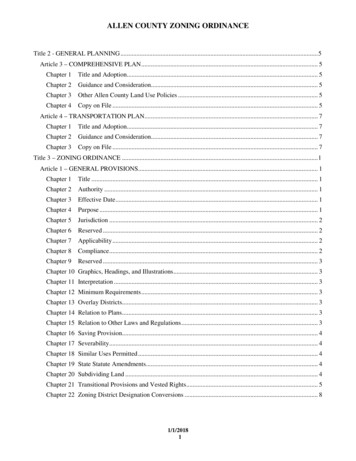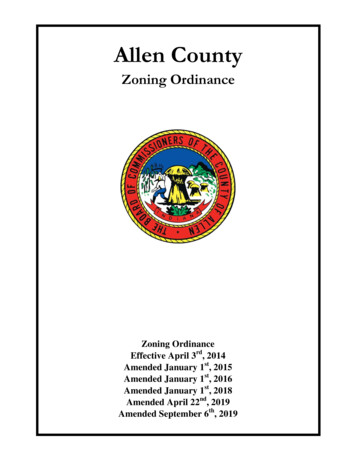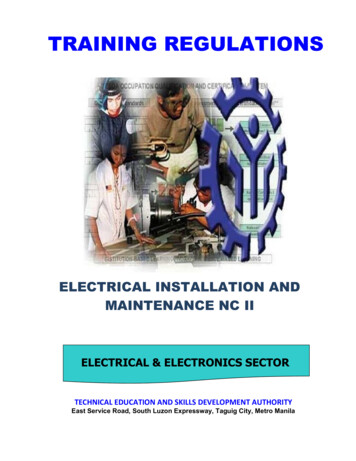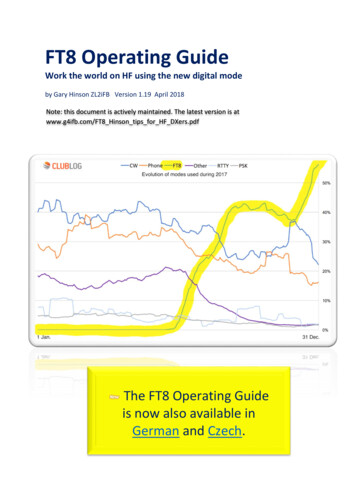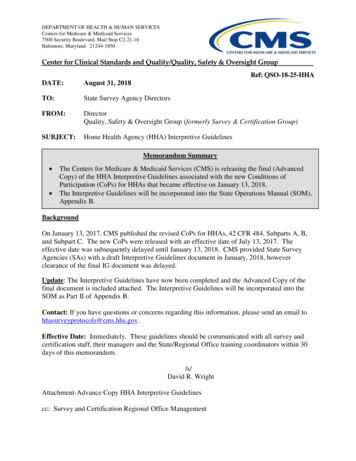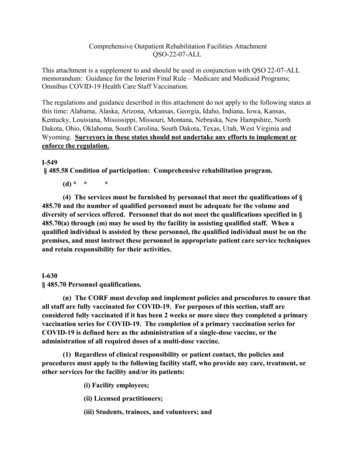
Transcription
Comprehensive Outpatient Rehabilitation Facilities AttachmentQSO-22-07-ALLThis attachment is a supplement to and should be used in conjunction with QSO 22-07-ALLmemorandum: Guidance for the Interim Final Rule – Medicare and Medicaid Programs;Omnibus COVID-19 Health Care Staff Vaccination.The regulations and guidance described in this attachment do not apply to the following states atthis time: Alabama, Alaska, Arizona, Arkansas, Georgia, Idaho, Indiana, Iowa, Kansas,Kentucky, Louisiana, Mississippi, Missouri, Montana, Nebraska, New Hampshire, NorthDakota, Ohio, Oklahoma, South Carolina, South Dakota, Texas, Utah, West Virginia andWyoming. Surveyors in these states should not undertake any efforts to implement orenforce the regulation.I-549§ 485.58 Condition of participation: Comprehensive rehabilitation program.(d) ***(4) The services must be furnished by personnel that meet the qualifications of §485.70 and the number of qualified personnel must be adequate for the volume anddiversity of services offered. Personnel that do not meet the qualifications specified in §485.70(a) through (m) may be used by the facility in assisting qualified staff. When aqualified individual is assisted by these personnel, the qualified individual must be on thepremises, and must instruct these personnel in appropriate patient care service techniquesand retain responsibility for their activities.I-630§ 485.70 Personnel qualifications.(n) The CORF must develop and implement policies and procedures to ensure thatall staff are fully vaccinated for COVID-19. For purposes of this section, staff areconsidered fully vaccinated if it has been 2 weeks or more since they completed a primaryvaccination series for COVID-19. The completion of a primary vaccination series forCOVID-19 is defined here as the administration of a single-dose vaccine, or theadministration of all required doses of a multi-dose vaccine.(1) Regardless of clinical responsibility or patient contact, the policies andprocedures must apply to the following facility staff, who provide any care, treatment, orother services for the facility and/or its patients:(i) Facility employees;(ii) Licensed practitioners;(iii) Students, trainees, and volunteers; and
(iv) Individuals who provide care, treatment, or other services for the facilityand/or its patients, under contract or by other arrangement.staff:(2) The policies and procedures of this section do not apply to the following facility(i) Staff who exclusively provide telehealth or telemedicine services outside ofthe facility setting and who do not have any direct contact with patients andother staff specified in paragraph (n)(1) of this section; and(ii) Staff who provide support services for the facility that are performedexclusively outside of the facility setting and who do not have any directcontact with patients and other staff specified in paragraph (n)(1) of thissection.(3) The policies and procedures must include, at a minimum, the followingcomponents:(i) A process for ensuring all staff specified in paragraph (n)(1) of this section(except for those staff who have pending requests for, or who have beengranted, exemptions to the vaccination requirements of this section, or thosestaff for whom COVID-19 vaccination must be temporarily delayed, asrecommended by the CDC, due to clinical precautions and considerations)have received, at a minimum, a single-dose COVID-19 vaccine, or the firstdose of the primary vaccination series for a multi-dose COVID-19 vaccineprior to staff providing any care, treatment, or other services for the facilityand/or its patients;(ii) A process for ensuring that all staff specified in paragraph (n)(1) of thissection are fully vaccinated for COVID-19, except for those staff who havebeen granted exemptions to the vaccination requirements of this section, orthose staff for whom COVID-19 vaccination must be temporarily delayed, asrecommended by the CDC, due to clinical precautions and considerations;(iii) A process for ensuring the implementation of additional precautions,intended to mitigate the transmission and spread of COVID-19, for all staffwho are fully vaccinated for COVID-19;(iv) A process for tracking and securely documenting the COVID-19vaccination status of all staff specified in paragraph (n)(1) of this section;(v) A process for tracking and securely documenting the COVID-19vaccination status of any staff who have obtained any booster doses asrecommended by the CDC;(vi) A process by which staff may request an exemption from the staffCOVID-19 vaccination requirements based on an applicable Federal law;
(vii) A process for tracking and securely documenting information providedby those staff who have requested, and for whom the facility has granted, anexemption from the staff COVID-19 vaccination requirements;(viii) A process for ensuring that all documentation, which confirmsrecognized clinical contraindications to COVID-19 vaccines and whichsupports staff requests for medical exemptions from vaccination, has beensigned and dated by a licensed practitioner, who is not the individualrequesting the exemption, and who is acting within their respective scope ofpractice as defined by, and in accordance with, all applicable State and locallaws, and for further ensuring that such documentation contains(A) All information specifying which of the authorized COVID-19vaccines are clinically contraindicated for the staff member to receiveand the recognized clinical reasons for the contraindications; and(B) A statement by the authenticating practitioner recommending thatthe staff member be exempted from the facility’s COVID-19vaccination requirements for staff based on the recognized clinicalcontraindications;(ix) A process for ensuring the tracking and secure documentation of thevaccination status of staff for whom COVID-19 vaccination must betemporarily delayed, as recommended by the CDC, due to clinicalprecautions and considerations, including, but not limited to, individualswith acute illness secondary to COVID-19, and individuals who receivedmonoclonal antibodies or convalescent plasma for COVID-19 treatment; and(x) Contingency plans for staff who are not fully vaccinated for COVID-19.GUIDANCEDEFINITIONS“Booster”: per CDC, refers to a dose of vaccine administered when the initial sufficientimmune response to a primary vaccine is likely to have waned over time.“Clinical contraindication” refers to conditions or risks that precludes the administration of atreatment or intervention. With regard to recognized clinical contraindications to receiving aCOVID-19 vaccine, facilities should refer to the CDC informational document, SummaryDocument for Interim Clinical Considerations for Use of COVID-19 Vaccines CurrentlyAuthorized in the United States, accessed at mary-interim-clinical-considerations.pdf. For COVID-19 vaccines, accordingto the CDC, a vaccine is clinically contraindicated if an individual has a severe allergic reaction(e.g., anaphylaxis) after a previous dose or to component of the COVID-19 vaccine or animmediate (within 4 hours of exposure) allergic reaction of any severity to a previous dose orknown (diagnosed) allergy to a component of the vaccine.
“Fully vaccinated” refers to staff who are two weeks or more from completion of their primaryvaccination series for COVID-19.“Good Faith Effort” refers to a provider that has taken aggressive steps toward achievingcompliance with staff vaccination requirement and/or the provider has no or has limited accessto vaccine, and has documented attempts to access to the vaccine.“Primary Vaccination Series” refers to staff who have received a single-dose vaccine or allrequired doses of a multi-dose vaccine for COVID-19.“Staff” refers to individuals who provide any care, treatment, or other services forthe CORF and/or its patients, including employees; licensed practitioners; adult students,trainees, and volunteers; and individuals who provide care, treatment, or other services forthe CORF and/or its patients, under contract or other arrangement. This also includes individualsunder contract or arrangement with the CORF, including hospice and dialysis staff, physicaltherapists, occupational therapists, mental health professionals, licensed practitioners, or adultstudents, trainees or volunteers. Staff would not include anyone who provides onlytelemedicine services or support services outside of the CORF and who does not have anydirect contact with patients and other staff specified in paragraph (n)(1).“Temporarily delayed vaccination” refers to vaccination must be temporarily postponed, asrecommended by CDC, due to clinical precautions and considerations, including, but not limitedto, individuals with acute illness secondary to COVID-19, or individuals who receivedmonoclonal antibodies or convalescent plasma for COVID-19 treatment in the last 90 kground:All CORFs are required to achieve a 100% vaccination rate for their staff through the developmentof a policy to address vaccination applicable to all staff who provide any care, treatment, or otherservices for the CORF and/or its patients.There may be many infrequent services and tasks performed in or for a health care CORF that isconducted by “one-off” vendors, volunteers, and professionals. CORFs are not required toensure the vaccination of individuals who very infrequently provide ad hoc non-healthcareservices (such as annual elevator inspection), services that are performed exclusively off-site, notat or adjacent to any site of patient care (such as accounting services), but they may choose toextend COVID-19 vaccination requirements to them if feasible. CORFs should consider thefrequency of presence, services provided, and proximity to patients and staff.Surveying for ComplianceSurveyors will begin surveying for compliance 30 days after issuance of QSO-22-07 ALLmemorandum, through a full survey for recertification, federal initial surveys, or a complaintsurvey. Surveyors will be guided to focus on the vaccination status and CORF policies to address
vaccination for staff that regularly work in the CORF (e.g., weekly), using a phased-in approachas described below. CORFs will be expected to meet the following:Vaccination EnforcementCMS expects all facilities’ staff to have received the appropriate number of doses by thetimeframes specified in this memorandum unless exempted as required by law. Facility staffvaccination rates under 100% constitute non-compliance under the rule.Within 30 days following the issuance of this memorandum 1, if the facility demonstrates: Policies and procedures are developed and implemented for ensuring all facility staff,regardless of clinical responsibility or patient contact are vaccinated for COVID-19,including all required components of the policies and procedures specified below (e.g.,related to tracking staff vaccinations, documenting medical and religious exemptions,etc.); and 100% of staff have received at least one dose of COVID-19 vaccine or have a pendingrequest for, or have been granted a qualifying exemption, or are identified as having atemporary delay as recommended by the CDC, the facility is compliant under the rule.;or Less than 100% of all staff have received at least one dose of COVID-19 vaccine, or havea pending request for, or have been granted a qualifying exemption, or are identified ashaving a temporary delay as recommended by the CDC, the facility is non-compliantunder the rule. The facility will receive notice 2 of their non-compliance with the 100%standard. A facility that is above 80% and has a plan to achieve a 100% staff vaccination ratewithin 60 days would not be subject to additional enforcement action. States should work withtheir CMS location for cases that exceed these thresholds, yet pose a threat to patient health andsafety. Facilities that do not meet these parameters could be subject to additional enforcementactions depending on the severity of the deficiency and the type of facility (e.g., plans ofcorrection and termination.).Within 60 days following the issuance of this memorandum 3, if the facility demonstrates: Policies and procedures are developed and implemented for ensuring all facility staff,regardless of clinical responsibility or resident contact are vaccinated for COVID-19,including all required components of the policies and procedures specified below (e.g.,related to tracking staff vaccinations, documenting medical and religious exemptions,etc.); and 100% of staff have received the necessary doses to complete the vaccine series (i.e., onedose of a single-dose vaccine or all doses of a multiple vaccine series) or have beengranted a qualifying exemption, or are identified as having a temporary delay asrecommended by the CDC, the facility is compliant under the rule; orIf 30 days falls on a weekend or designated federal holiday, CMS will use enforcement discretion to initiatecompliance assessments the next business day2This information will be communicated through the CMS Form-2567, using the appropriate Automated SurveyProcess Environment (ASPEN).33If 60 days falls on a weekend or designated federal holiday, CMS will use enforcement discretion to initiatecompliance assessments the next business day1
Less than 100% of all staff have received at least one dose of a single-dose vaccine, or alldoses of a multiple vaccine series, or have been granted a qualifying exemption, or areidentified as having a temporary delay as recommended by the CDC, the facility is noncompliant under the rule. The facility will receive notice 4 of their non-compliance withthe 100% standard. A facility that is above 90% and has a plan to achieve a 100% staffvaccination rate within 30 days would not be subject to an enforcement action. Statesshould work with their CMS location for cases that exceed these thresholds, yet pose a threat topatient health and safety. Facilities that do not meet these parameters could be subject toadditional enforcement actions depending on the severity of the deficiency and the typeof facility (e.g., plan of correction, termination).Within 90 days and thereafter following issuance of the memorandum, facilities failing tomaintain compliance with the 100% standard may be subject to enforcement action.Note: The requirements above do not include the 14-day waiting period as identified byCDC for full vaccination. Rather these requirements are considered met with thecompleted vaccine series (i.e., one dose of a single dose vaccine, or final dose of a multidose vaccine series).Policies and ProceduresThe CORF policies and procedures must be implemented within 30 days 5 of the publication ofthis regulation and address each of the following components:CORF’s must have a process for ensuring all staff (as defined above) have received at least asingle-dose, or the first dose of a multi-dose COVID-19 vaccine series prior to providing anycare, treatment, or other services for the facility and/or its patients.The policy must also ensure those staff who are not yet fully vaccinated, or who have beengranted an exemption or accommodation as authorized by law, or who have a temporary delay,adhere to additional precautions that are intended to mitigate the spread of COVID-19. There area variety of actions or job modifications a facility can implement to potentially reduce the risk ofCOVID-19 transmission including, but not limited to: Reassigning staff who have not completed their primary vaccination series to nonpatient care areas, to duties that can be performed remotely (i.e., telework), or to dutieswhich limit exposure to those most at risk (e.g., assign to patients who are notimmunocompromised, unvaccinated); Requiring staff who have not completed their primary vaccination series to followadditional, CDC-recommended precautions, such as adhering to universal source controland physical distancing measures in areas that are restricted from patient access (e.g.,staff meeting rooms, kitchen), even if the facility or service site is located in a countywith low to moderate community transmission.4This information will be communicated through the CMS Form-2567, using the appropriate Automated SurveyProcess Environment (ASPEN).If 30 days falls on a weekend or designated federal holiday, CMS will use enforcement discretion to initiatecompliance assessments the next business day5
Requiring at least weekly testing for exempted staff and staff who have not completedtheir primary vaccination series, until the regulatory requirements are met, regardless ofwhether the facility or service site is located in a county with low to moderate communitytransmission, in addition to following CDC recommendations for testing unvaccinated infacilities located in counties with substantial to high community transmission.Requiring staff who have not completed their primary vaccination series to use a NIOSHapproved N95 or equivalent or higher-level respirator for source control, regardless ofwhether they are providing direct care to or otherwise interacting with patientsFacilities may also consult with their local health departments to identify other actions that canpotentially reduce the risk of COVID-19 transmission from unvaccinated staff.The CORF must track and securely document: Each staff member’s vaccination status (this should include the specific vaccine received,and the dates of each dose received, or the date of the next scheduled dose for a multidose vaccine); Any staff member who has obtained any booster doses (this should include the specificvaccine booster received and the date of the administration of the booster); Staff who have been granted an exemption from vaccination (this should include the typeof exemption and supporting documentation) requirements by the CORF; and Staff for whom COVID-19 vaccination must be temporarily delayed and should trackwhen the identified staff can safely resume their vaccination.Facilities that employ or contract staff who telework full-time (e.g., 100 percent of their time isremote from sites of patient care and staff who do work at sites of care) should identify theseindividuals as a part of implementing the facility’s policies and procedures, but those individualsare not subject to the vaccination requirements. Note, however, that these individuals may besubject to other federal requirements for COVID-19 vaccination. Facilities have the flexibility touse the tracking tools of their choice; however, they must provide evidence of this tracking forsurveyor review. Additionally, facilities’ tracking mechanism should clearly identify each staff’srole, assigned work area, and how they interact with patients. This includes staff who arecontracted, volunteers, or students.Vaccination Exemptions:Facilities must have a process by which staff may request an exemption from COVID-19vaccination based on an applicable Federal law. This process should clearly identify how anexemption is requested, and to whom the request must be made. Additionally, facilities musthave a process for collecting and evaluating such requests, including the tracking and securedocumentation of information provided by those staff who have requested exemption, thefacility’s determination of the request, and any accommodations that are granted.Note: Staff who are unable to furnish proper exemption documentation must be vaccinated or thefacility must follow the actions for unvaccinated staff.Medical Exemptions:
Certain allergies, or recognized medical conditions may provide grounds for an exemption. Withregard to recognized clinical contraindications to receiving a COVID-19 vaccine, CORFs shouldrefer to the CDC informational document, Summary Document for Interim ClinicalConsiderations for Use of COVID-19 Vaccines Currently Authorized in the United States,accessed at mmary-interim-clinicalconsiderations.pdf. In general, CDC considers a history of a severe allergic reaction (e.g.,anaphylaxis) after a previous dose or to a component of the COVID-19 vaccine, or an immediate(within 4 hours of exposure) allergic reaction of any severity to a previous dose, or known(diagnosed) allergy to a component of the COVID-19 vaccine, to be a contraindication tovaccination with COVID-19 vaccines.Medical exemption documentation must specify which authorized or licensed COVID-19vaccine is clinically contraindicated for the staff member and the recognized clinical reasons forthe contraindication. The documentation must also include a statement recommending that thestaff member be exempted from the CORF’s COVID-19 vaccination requirements based on themedical contraindications.A staff member who requests a medical exemption from vaccination must providedocumentation signed and dated by a licensed practitioner acting within their respective scope ofpractice and in accordance with all applicable State and local laws. The individual who signs theexemption documentation cannot be the same individual requesting the exemption.CORFs must have a process to track and secure documentation of the vaccine status of staffwhose vaccine is temporarily delayed. CDC recommends a temporary delay in administering theCOVID-19 vaccination due to clinical precautions and considerations such as individuals withacute illness secondary to COVID-19 illness, and individuals who received monoclonalantibodies, or convalescent plasma for COVID-19 treatment.Non-Medical Exemptions, Including Religious Exemptions:Requests for non-medical exemptions, such as a religious exemption in accordance with TitleVII, must be documented and evaluated in accordance with each CORF’s policies andprocedures. We direct CORFs to the Equal Employment Opportunity Commission (EEOC)Compliance Manual on Religious Discrimination gious-discrimination) for information on s evaluating and responding to such requests.Note: Surveyors will not evaluate the details of the request for a religious exemption, nor therationale for the CORF’s acceptance or denial of the request. Rather, surveyors will review toensure the CORF has an effective process for staff to request a religious exemption for asincerely held religious belief.Accommodations of Unvaccinated Staff with a Qualifying Exemption:While accommodations could be appropriate under certain limited circumstances, noaccommodation should be provided to staff that is not legally required. For individual staffmembers that have valid reasons for exemption facility can address those individually. Anexample of an accommodation for an unvaccinated employee with a qualifying exemption couldinclude mandatory routine COVID-19 testing in accordance with OSHA and CDC guidelines,physical distancing from co-workers and patients, re-assignment or modification of duties,
teleworking, or a combination of these actions. Accommodations can be addressed in theCORF’s policies and procedures.Staff who have been granted an exemption to COVID-19 vaccination requirements shouldadhere to national infection prevention and control standards for unvaccinated health carepersonnel. For additional information see CDC’s Interim Infection Prevention and ControlRecommendations for Healthcare Personnel During the Coronavirus Disease 2019 (COVID-19)Pandemic webpage.Regulatory Provisions implemented 60 days after issuance of this memorandum:Facilities must have a process for ensuring that all staff are fully vaccinated for COVID-19,except for those staff who have been granted exemptions to the vaccination requirements of thissection, or those staff for whom COVID-19 vaccination must be temporarily delayed, asrecommended by CDC, due to clinical precautions and considerations.Contingency PlanFor staff that are not fully vaccinated, the CORF must develop contingency plans for staff whohave not completed the primary vaccination series for COVID-19Contingency plans should include actions that the CORF would take when staff have indicatedthat they will not get vaccinated and do not qualify for an exemption, but contingency plansshould also address staff who are not fully vaccinated due to an exemption or temporary delay invaccination, such as through the additional precautions. Facilities should prioritize contingencyplans for those staff that have obtained no doses of any vaccine over staff that have received asingle dose of a multi-dose vaccine. For example, contingency plans could include a deadline forstaff to have obtained their first dose of a multiple-dose vaccine. The plans should also indicatethe actions the CORF will take if the deadline is not met, such as actively seeking replacementstaff through advertising or obtaining temporary vaccinated staff until permanent vaccinatedreplacements can be found.Survey ProcessCompliance will be assessed through observation, interview, and record review as part ofthe survey process.1. Entrance Conference Surveyors will ask CORFs to provide vaccination policies and procedures. At aminimum, the policy and procedures must provide:o A process for ensuring all required staff have received, at a minimum, thefirst dose of a multi-dose COVID-19 vaccine, or a one-dose COVID-19vaccine, before staff provide any care, treatment, or other services forthe CORF and/or its patients;o A process for ensuring that all required staff are fully vaccinated;o A process for ensuring that the CORF continues to follow all standards ofinfection prevention and control practice, for reducing the transmissionand spread of COVID-19 in the CORF, especially by those staff who areunvaccinated or who are not yet fully vaccinated;
A process for tracking and securely documenting the COVID-19vaccination status for all required staff;o A process for ensuring all staff obtain any recommended booster doses,and any recommended additional doses for individuals who areimmunocompromised, in accordance with the recommended timing ofsuch doses;o A process by which staff may request a vaccine exemptionfrom the COVID-19 vaccination requirements based on recognizedclinical contraindications or applicable Federal laws, such as religiousbeliefs or other accommodationso A process for tracking and securely documenting information confirmingrecognized clinical contraindications to COVID-19 vaccines provided bythose staff who have requested and have been granted a medicalexemption to vaccination;o A process for ensuring that all documentation, which confirms recognizedclinical contraindications to COVID-19 vaccines and which supports staffrequests for medical exemptions from vaccination, has been signed anddated by a licensed practitioner, who is not the individual requesting theexemption, and who is acting within their respective scope of practice asdefined by, and in accordance with, all applicable State and local laws,and for further ensuring that such documentation contains— all information specifying which of the authorized COVID-19vaccines are clinically contraindicated for the staff member toreceive and the recognized clinical reasons for thecontraindications; and a statement by the authenticating practitioner recommending thatthe staff member be exempted from the CORF’s COVID-19vaccination requirements for staff based on the recognized clinicalcontraindications;o A process for ensuring the tracking and secure documentation of thevaccination status of staff for whom COVID-19 vaccination must betemporarily delayed, as recommended by the CDC, due to clinicalprecautions and considerations, including, but not limited to, individualswith acute illness secondary to COVID-19, or individuals who receivedmonoclonal antibodies or convalescent plasma for COVID-19 treatment;ando Contingency plans for staff that are not yet vaccinated for COVID-19 (andwithout an exemption for medical contraindications or without atemporary delay in vaccination due to clinical considerationsas recommended by the CDC and as specified in paragraph (n)(3)(x)),including deadlines for staff to be vaccinated.The CORF will provide a list of all staff and their vaccine status.o Including the percentage of unvaccinated staff, excluding those staff thathave approved exemptionso If any concerns are identified with the staff vaccine status list, surveyorsshould verify the percentage of vaccinated staff.o
o The CORF must identify any staff member remaining unvaccinatedbecause it’s medically contraindicated or has a religious exemption.o The CORF must also identify newly hired staff (hired in the last 60 days).o The CORF must indicate the position or role of each staff member2. Record Review, interview, and observations: Surveyors will review the policy and procedure to ensure all components arepresent. Surveyors will review any contingency plan developed to mitigate the spread ofCOVID-19 infections by the CORF that may include:o Requiring unvaccinated staff to follow additional, CDC-recommendedprecautions, such as adhering to universal source control and physicaldistancing measures in areas that are restricted from patient access (e.g.,staff meeting rooms, kitchen), even if the facility or service site is locatedin a county with low to moderate community transmission.o Reassigning unvaccinated staff to non-patient care areas, to duties that canbe performed remotely (i.e., telework), or to duties which limit exposureto those most at risk (e.g., assign to patients who are notimmunocompromised, unvaccinated);o Requiring at least weekly testing for unvaccinated staff, regardless ofwhether the facility or service site is located in a county with low tomoderate community transmissiono Requiring unvaccinated staff to use a NIOSH-approved N95 or equivalentor higher-level respirator for source control, regardless of whether they areproviding direct care to or otherwise interacting with patien
Comprehensive Outpatient Rehabilitation Facilities Attachment . QSO-22-07-ALL . This attachment is a supplement to and should be used in conjunction with QSO 22-07-ALL memorandum: Guidance for the Interim Final Rule - Medicare and Medicaid Programs; Omnibus COVID-19 Health Care Staff Vaccination.
